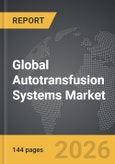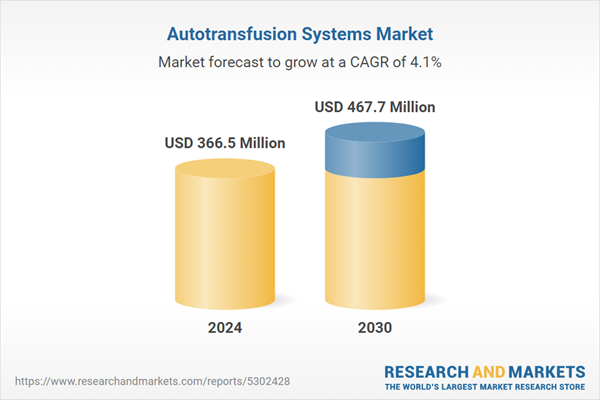Global Autotransfusion Systems Market - Key Trends and Drivers Summarized
What Are Autotransfusion Systems, and How Are They Transforming Blood Management in Surgery?
Autotransfusion systems are medical devices designed to collect, filter, and return a patient's own blood during surgery, transforming how blood is managed in operating rooms and trauma settings. Traditionally, patients requiring blood during surgery have relied on donor blood transfusions, which can introduce risks such as immune reactions, infections, and limited availability of compatible blood types. Autotransfusion, or cell salvage, allows for the collection of a patient's own blood that is lost during surgery, filtering and cleaning it of impurities before reinfusing it back into the patient. This process reduces dependence on donor blood and minimizes the risk of transfusion reactions and transmission of bloodborne diseases. Autotransfusion systems are particularly valuable in surgeries involving significant blood loss, such as cardiac, orthopedic, and vascular procedures, as well as in trauma care. As technology advances, autotransfusion systems have become more effective and compact, making them accessible in a wider range of clinical settings, including emergency rooms and battlefield medicine. By utilizing the patient's own blood, these systems provide a safer, more efficient, and cost-effective alternative to traditional transfusions, enhancing patient outcomes and setting new standards in blood conservation.How Are Autotransfusion Systems Being Utilized Across Different Medical Specialties?
The versatility of autotransfusion systems has led to their adoption across various medical specialties, each leveraging this technology to meet unique surgical and emergency care needs. In cardiovascular surgery, where blood loss can be significant, autotransfusion systems help maintain stable blood volume and hemoglobin levels, reducing the need for allogeneic (donor) blood transfusions. This is especially important in complex procedures such as open-heart surgeries or aneurysm repairs, where even a small reduction in blood supply can have serious consequences. Orthopedic surgery is another area where autotransfusion systems play a vital role, particularly in joint replacements and spinal surgeries that may involve considerable blood loss. Autotransfusion minimizes the risk of transfusion reactions and supports faster recovery by avoiding foreign blood products. In trauma and emergency care, where rapid response is critical, autotransfusion systems allow clinicians to stabilize patients in situations where donor blood may not be immediately available. In obstetric care, autotransfusion systems can be used in cases of postpartum hemorrhage, reducing the risk to mother and child when blood loss is substantial. The adaptability of autotransfusion systems makes them invaluable in diverse clinical settings, where they enhance patient safety, improve outcomes, and offer healthcare providers greater control over blood management in surgeries and emergencies.What Challenges Do Autotransfusion Systems Face in Widespread Adoption?
While autotransfusion systems offer numerous benefits, several challenges must be overcome to achieve broader adoption. One major consideration is cost, as autotransfusion equipment can be expensive to acquire and maintain, making it less accessible for smaller clinics and hospitals with limited resources. Additionally, the operation of these systems requires trained personnel, and not all healthcare settings have staff with the necessary expertise, particularly in rural or under-resourced areas. Clinical limitations are another factor; autotransfusion is not suitable for all types of surgeries or for patients with certain conditions, such as infections or malignancies, where reinfusing salvaged blood may pose a risk. Technical challenges also arise from the need for precision in filtering and processing blood to ensure it is safe for reinfusion, as any contaminants left in the blood could cause adverse reactions. Furthermore, some cultural and patient-specific concerns surround the use of autotransfusion, with certain patients expressing reluctance or personal beliefs against receiving their own blood if it has left the body, presenting an additional barrier to its acceptance. Overcoming these economic, clinical, and logistical challenges requires targeted training programs, technological advancements to improve cost efficiency and usability, and efforts to educate both medical professionals and patients on the safety and efficacy of autotransfusion.What Major Factors Are Behind the Growth of the Autotransfusion System Market?
The autotransfusion system market is experiencing notable growth, driven by advancements in medical technology, rising awareness of blood conservation, and the increasing prevalence of complex surgeries with high blood loss. Technological innovations have led to the development of more compact, efficient, and user-friendly autotransfusion systems that can be integrated into a wider variety of surgical environments, from large hospitals to smaller clinics. This versatility has expanded the potential for autotransfusion across multiple surgical fields, including cardiovascular, orthopedic, and trauma surgery. Furthermore, the growing focus on patient safety and reducing transfusion-related complications has spurred healthcare providers to adopt methods that conserve blood and lower dependence on donor supplies. With shortages in the global blood supply and concerns about transfusion-transmissible infections, autotransfusion offers a reliable alternative that reduces demand for donor blood, aligning with hospitals' goals to improve safety and preparedness. The increase in aging populations, especially in developed countries, is also a factor, as older patients undergoing surgery may have conditions that make allogeneic transfusions riskier, making autotransfusion a preferred choice. Additionally, regulatory and healthcare guidelines now emphasize blood management strategies that include autotransfusion, particularly in countries focused on patient-centered and cost-effective care. These intersecting factors - technological advances, rising demand for safer transfusions, demographic changes, and regulatory support - are propelling the growth of the autotransfusion market, cementing it as a valuable solution in modern healthcare.Report Scope
The report analyzes the Autotransfusion Systems market, presented in terms of market value (US$ Thousand). The analysis covers the key segments and geographic regions outlined below.- Segments: Type (Autotransfusion Products, Autotransfusion Accessories); Application (Cardiovascular Surgeries, Orthopedic Surgeries, Obstetrics & Gynecological Surgeries, Neurological Surgeries, Other Applications).
- Geographic Regions/Countries:World; United States; Canada; Japan; China; Europe (France; Germany; Italy; United Kingdom; and Rest of Europe); Asia-Pacific; Rest of World.
Key Insights:
- Market Growth: Understand the significant growth trajectory of the Autotransfusion Products segment, which is expected to reach US$336.2 Million by 2030 with a CAGR of a 4.5%. The Autotransfusion Accessories segment is also set to grow at 3.3% CAGR over the analysis period.
- Regional Analysis: Gain insights into the U.S. market, valued at $100.2 Million in 2024, and China, forecasted to grow at an impressive 4% CAGR to reach $74.7 Million by 2030. Discover growth trends in other key regions, including Japan, Canada, Germany, and the Asia-Pacific.
Why You Should Buy This Report:
- Detailed Market Analysis: Access a thorough analysis of the Global Autotransfusion Systems Market, covering all major geographic regions and market segments.
- Competitive Insights: Get an overview of the competitive landscape, including the market presence of major players across different geographies.
- Future Trends and Drivers: Understand the key trends and drivers shaping the future of the Global Autotransfusion Systems Market.
- Actionable Insights: Benefit from actionable insights that can help you identify new revenue opportunities and make strategic business decisions.
Key Questions Answered:
- How is the Global Autotransfusion Systems Market expected to evolve by 2030?
- What are the main drivers and restraints affecting the market?
- Which market segments will grow the most over the forecast period?
- How will market shares for different regions and segments change by 2030?
- Who are the leading players in the market, and what are their prospects?
Report Features:
- Comprehensive Market Data: Independent analysis of annual sales and market forecasts in US$ Million from 2024 to 2030.
- In-Depth Regional Analysis: Detailed insights into key markets, including the U.S., China, Japan, Canada, Europe, Asia-Pacific, Latin America, Middle East, and Africa.
- Company Profiles: Coverage of players such as Atrium Medical Corporation (A Part of Getinge Group), Becton, Dickinson and Company, Beijing ZKSK Technology Co., Ltd., Braile Biomédica, Fresenius Medical Care AG & Co. KGaA and more.
- Complimentary Updates: Receive free report updates for one year to keep you informed of the latest market developments.
Some of the 42 companies featured in this Autotransfusion Systems market report include:
- Atrium Medical Corporation (A Part of Getinge Group)
- Becton, Dickinson and Company
- Beijing ZKSK Technology Co., Ltd.
- Braile Biomédica
- Fresenius Medical Care AG & Co. KGaA
- Gen World Medical Devices
- Haemonetics Corporation
- Livanova PLC
- Medtronic PLC
- Redax
This edition integrates the latest global trade and economic shifts into comprehensive market analysis. Key updates include:
- Tariff and Trade Impact: Insights into global tariff negotiations across 180+ countries, with analysis of supply chain turbulence, sourcing disruptions, and geographic realignment. Special focus on 2025 as a pivotal year for trade tensions, including updated perspectives on the Trump-era tariffs.
- Adjusted Forecasts and Analytics: Revised global and regional market forecasts through 2030, incorporating tariff effects, economic uncertainty, and structural changes in globalization. Includes historical analysis from 2015 to 2023.
- Strategic Market Dynamics: Evaluation of revised market prospects, regional outlooks, and key economic indicators such as population and urbanization trends.
- Innovation & Technology Trends: Latest developments in product and process innovation, emerging technologies, and key industry drivers shaping the competitive landscape.
- Competitive Intelligence: Updated global market share estimates for 2025, competitive positioning of major players (Strong/Active/Niche/Trivial), and refined focus on leading global brands and core players.
- Expert Insight & Commentary: Strategic analysis from economists, trade experts, and domain specialists to contextualize market shifts and identify emerging opportunities.
Table of Contents
Companies Mentioned (Partial List)
A selection of companies mentioned in this report includes, but is not limited to:
- Atrium Medical Corporation (A Part of Getinge Group)
- Becton, Dickinson and Company
- Beijing ZKSK Technology Co., Ltd.
- Braile Biomédica
- Fresenius Medical Care AG & Co. KGaA
- Gen World Medical Devices
- Haemonetics Corporation
- Livanova PLC
- Medtronic PLC
- Redax
Table Information
| Report Attribute | Details |
|---|---|
| No. of Pages | 144 |
| Published | January 2026 |
| Forecast Period | 2024 - 2030 |
| Estimated Market Value ( USD | $ 366.5 Million |
| Forecasted Market Value ( USD | $ 467.7 Million |
| Compound Annual Growth Rate | 4.1% |
| Regions Covered | Global |









